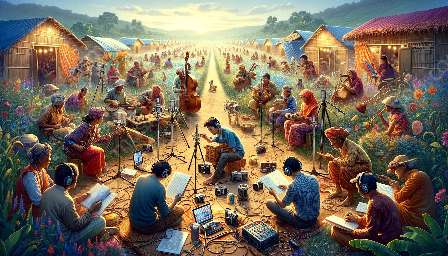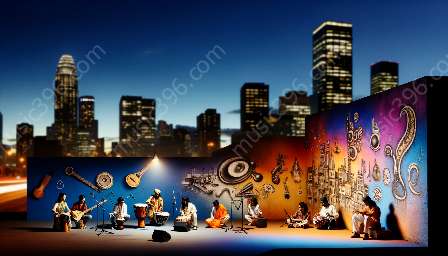Music has long been recognized as a powerful tool for cultural resistance, challenging dominant ideologies and influencing the formation of individual and collective identities. This article explores the multifaceted ways in which music serves as a means of resistance against cultural hegemony and its intersections with issues of identity and ethnomusicology.
Musical Expression as a Tool for Resistance
Perhaps one of the most notable ways in which music functions as a form of resistance is through its potential to provide a platform for marginalized voices. Musicians often use their art to address social, political, and cultural injustices, offering a counter-narrative to dominant discourses. By expressing dissent and challenging prevailing power structures through lyrics and melodies, music becomes a mechanism for promoting social change and resisting cultural hegemony.
Cultural Hegemony and Identity Formation
Music's role in resistance against cultural hegemony is deeply intertwined with the formation of individual and collective identities. Dominant cultural narratives and representations often shape individuals' perceptions of their own identities, imposing specific norms and values. In this context, music becomes a means of reclaiming and asserting alternative and often marginalized identities. It provides a space for individuals to express their experiences and perspectives, contributing to the construction of multifaceted identities that challenge hegemonic cultural norms.
Reclaiming Cultural Heritage
Furthermore, music serves as a tool for reclaiming and preserving cultural heritage in the face of cultural hegemony. Ethnic and indigenous communities often confront the erasure and commodification of their cultural traditions by dominant forces. Through musical practices rooted in traditional knowledge and rituals, these communities resist assimilation and maintain their cultural autonomy. Ethnomusicology plays a critical role in documenting and studying these expressions of resistance, contributing to a deeper understanding of the complex interplay between music, cultural hegemony, and identity.
Intersectionality and Resistance in Music
It is important to recognize that resistance against cultural hegemony through music is often intersectional, encompassing various forms of oppression and marginalization. Music becomes a vehicle for addressing interconnected systems of power, such as racism, sexism, and classism, and serves as a platform for solidarity and coalition building across diverse communities. By acknowledging the intersectional nature of resistance in music, ethnomusicologists and scholars can offer nuanced analyses of how music contributes to broader social and political movements seeking to dismantle hegemonic structures.
Conclusion
Music's capacity to resist cultural hegemony and its impact on issues of identity and ethnomusicology is profound and multifaceted. As a form of creative expression, music challenges dominant narratives, empowers marginalized voices, and contributes to the preservation of diverse cultural traditions. By examining music through the lenses of resistance and identity, we gain insights into the complex dynamics of power, agency, and cultural resilience.



































